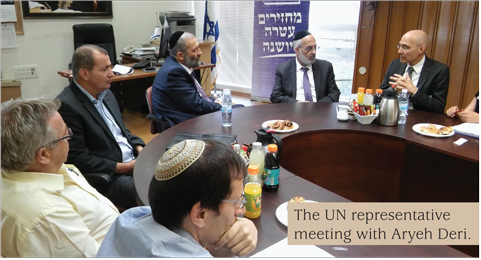The Long-Awaited Deal
For much of last week, the entire country’s attention was occupied by a single topic: the agreement with Turkey that was taking shape. The agreement normalized Israel’s relations with Turkey. There has been friction between the two countries since the Marmara incident in 2010, when Israeli soldiers boarded the Turkish flotilla and discovered that it was carrying weapons – and not merely food – to the residents of Gaza. Since that time, the two countries had parted ways.
The agreement includes compensatory payments to the families of the flotilla passengers who were killed, along with the easing of some aspects of the Israeli blockade of Gaza. Turkey, for its part, has pledged to cease calling for Israeli officers to be arrested and tried. At the same time, Turkey has not brought about any progress in retrieving the bodies of Hadar Goldin and Oron Shaul, the two IDF soldiers who were killed in the 2014 war in Gaza and whose remains were lost.
The agreement was signed last Tuesday and approved retroactively in the cabinet on Wednesday.
The parents of the two slain soldiers demonstrated in front of the prime minister’s office and called on every government minister who arrived to refrain from supporting the agreement. It was heartbreaking to hear the bereaved mothers making their case to the unresponsive ministers. Ultimately, only three government ministers opposed the agreement: Avigdor Lieberman, Ayelet Shaked, and Naftali Bennett.
We all thought that this would be the only hot topic of the week, but then there was a terror attack in Turkey’s international airport in which 43 people, 19 of them tourists, were killed, and another 230 were wounded. Presumably, ISIS is responsible for this attack, which was carried out by three of its “soldiers.” Then, just when we thought that the tumultuous events of the week were over, there was an attempted terror attack on Route 443, where a terrorist riding on a motorcycle shot at a passing car. A young girl was also wounded at the Kosel by a rock thrown from Har Habayis, and a man and woman were wounded by a terrorist in the heart of the city of Netanya.
There have been many terror attacks on Route 443, some of which have even resulted in a loss of life, but this time the location was different: The attack took place immediately outside Yerushalayim, at the Benzion Interchange (named for Benzion Netanyahu), where the highway intersects with the road leading to Neve Yaakov and Pisgat Ze’ev. In addition to all this, Thursday’s terrible tragedy in Kiryat Arba was utterly unspeakable.
A Nation Weeps
This past Thursday, a 13-year-old girl, Hallel Yaffa Ariel, was murdered in her bed, in her home in Kiryat Arba, by a 17-year-old terrorist. The terrorist crossed the perimeter fence, setting off alarms that summoned the security personnel guarding the city, but before they could capture him, he infiltrated the girl’s home, which is located next to the fence, and killed her. She was buried that same day in the old cemetery of Chevron. Thousands of people wept bitterly at her funeral, where the participants were deeply moved by her mother’s cry: “Father, You entrusted this child to me for safekeeping, and I am returning her to You with love and faith.”
Uri Ariel, the Minister of Agriculture, is a cousin of the murder victim’s father. At the funeral, he swore to continue building the Land of Israel. Minister Naftali Bennett declared, “An entire nation is weeping. The entire country is crying: the settlers, the religious, the chilonim and the chareidim alike. Our entire nation is united; we are all in pain.”
At the same time the funeral took place, Prime Minister Binyomin Netanyahu spoke at an air force ceremony in Chatzerim. “Our hearts are in Kiryat Arba,” he declared. “At this very moment, in Chevron, Hallel Yaffa Ariel – an innocent girl who was murdered in her bed with horrific brutality by a despicable terrorist, whose heart was filled with hatred and incitement – is being buried. It is painful to see the pictures of her bedroom, with everything soaked in blood: the floor, the bed, and her clothes. It is a heartrending sight. To all the people in Israel and in other countries, I say: This is your daughter. This is your granddaughter.”
Demands have already been made to destroy the home of the 17-year-old murderer, and the political right has declared that they are watching Avigdor Lieberman to see how he will respond after he recently stressed the need to take such actions.
An Unprecedented Stir in the Knesset
The following item has a connection both to terrorism and to Turkey. Do you remember MK Hanin Zoabi? She is the member of the Knesset who was personally onboard the Marmara and who managed to infuriate the people of Israel even then. This time, it was the members of the Knesset whom she provoked, to the point that the plenum – for perhaps the first time in its history – became as disorderly as a Turkish bazaar, or the parliament of some Third World country. It was a deeply embarrassing incident for the country.
This took place during the debate over the agreement between Israel and Turkey, which some Knesset members supported and others opposed. Zoabi was one of the speakers during the debate, and while it was expected that she would defend the terrorists on the ship, no one could have imagined the extreme statements that she would make. Here is a portion of the exchange that took place in the Knesset that day.
Zoabi began, “Mr. Speaker, men and women of the Knesset, I stood here six years ago. Some of you remember what happened here six years ago; you recall the incitement.”
Oren Hazan (Likud) called out, “There was a terror flotilla. That is all that happened.”
Zoabi went on, ignoring him, “You remember the commotion. Now look what the time has come for: an apology. There will be an apology to the families who were called ‘terrorists.’”
Hazan interjected again, “It wasn’t that they were called that. They were terrorists. They were families of terrorists!”
“The nine people who were killed,” Zoabi said, “were activists whose families must be compensated. They fought with the soldiers, who claimed that they were trying to prevent… It was an act of piracy that Shayetet 13 boarded the ship, seized people and killed them. Now their families will be paid restitution.”
Oren Hazan was the first to grasp that Zoabi was accusing the IDF soldiers of murder. “You are referring to the soldiers?” he demanded. “You support terror! Go to Gaza!”
“I would expect, and I want and demand, that apologies will be made to all the political activists who were on the flotilla, and that there will be an apology to MK Hanin Zoabi, for you have incited against her and harassed her throughout the past six years. You must all apologize. Every member of the Knesset in this place, in this building, who participated in these things, must apologize to MK Hanin Zoabi. As for the compensation, I will receive it and I will donate it—”
“We will eject you from here, and we will take your salary back!” Oren Hazan exclaimed.
“I will donate the money to the next flotilla,” Zoabi continued. “The siege of Gaza must be lifted, and we must organize more and more flotillas. You murdered nine activists and incited against political activists.”
“Your friends commit murder every day,” Hazan shot back. “You are a partner to terrorists. You are not to call our soldiers murderers!”
At that point, even the members of the left began to grow aggravated. Yechiel Bar of the Zionist Camp exclaimed, “You are calling them murderers? You should be ashamed of yourself!”
“They committed murder!” Zoabi insisted. “They murdered people!”
Bar turned to the chairman and insisted, “Sir, she must apologize for accusing the soldiers of the IDF of murder. Tell her to apologize, sir!” To Zoabi, he said, “Who are you, anyway? Who do you think you are? You should be ashamed, you terrorist!”
With that, an uproar erupted in the Knesset plenum. About 20 Knesset members charged toward the speakers’ podium, while Zoabi stood at the microphone, chuckling. “Nu,” she taunted them, “are you going to hit me?” That only served to enrage them further. The chairman of the sitting, Hamad Amar, was a Knesset member who was inexperienced in that capacity and could not manage to restore order. He asked Zoabi to apologize, and she pretended to acquiesce, so he allowed her to continue speaking.
“MK Hanin Zoabi, I ask you to apologize for your statement about the soldiers of the IDF,” Amar said.
“Send her down from the podium!” Mickey Levi of Yesh Atid called out. “She must not be permitted to call us murderers.”
“You are murderers!” Zoabi repeated. “Murderers!”
“You have no business being here. You should be ashamed!” Levy shot back.
“I ask for silence,” Hamad Amar said. “Member of the Knesset, she wants to apologize. I ask you to please sit down.”
“She doesn’t want to apologize!” Nachman Shai of the Zionist Camp objected.
“I will apologize,” Zoabi said, but of course she had deceived the chairman. “Listen to me,” she continued.
“Don’t give us orders!” Nachman Shai called.
“You have to apologize,” added Aliza Lavie of Yesh Atid.
“Sit down and listen,” Zoabi insisted. “Sit down and listen! Calm down. Now, I will conclude with one more statement.”
“Sit down,” Amar said. “She is going to apologize. I ask everyone to please sit down.”
“Are you listening?” Zoabi said. “You are listening. Those who must apologize are the ones who committed murder! Nine people were murdered. You must apologize!”
“You are scum!” Mickey Levi shouted. “Get out of here! You belong in the company of scum. You are a sick human being. A sick human being!”
“Get her out of the plenum,” Hamad Amar ordered. “Remove her.”
The plenum dissolved into an uproar. Screams were heard from every direction. A group of ushers surrounded Zoabi, and she descended from the podium and left the plenum. It was a scene the likes of which has not occurred in the Knesset in many years, if at all. Zoabi did not even attempt to conceal her delight at the bedlam she had caused. In the following days, there were many debates over how to properly respond to her words. Prime Minister Netanyahu asked the government’s legal advisor to determine how to have Zoabi barred from the Knesset, although some protested even that step. After all, Zoabi was elected democratically.
The Cup Is Ours
Lest you think that the members of the Knesset do nothing but scream and fight, the following will show you that the Knesset has its share of diligent, dedicated people: The Knesset table tennis team recently won first place in the Mechoziadah, an annual tournament of various sports in which most of the competitors are government employees. Even the most respected government figures occasionally compete in the tournament, which also entitles them to a few days of vacation in Eilat every year.
The Knesset has several teams that compete in several different sports at the tournament, but it is usually the table tennis team that brings home the first prize. The most prominent player on the team is Yoel Yuli Edelsetin, the Speaker of the Knesset, who is considered an outstanding table tennis player. On his recent visit to China, Edelstein’s hosts surprised him by arranging a match with one of the senior heads of state. Another prominent player on the team is Udi Sharon, one of the most highly admired Knesset employees. Sharon, a resident of Bnei Brak and a highly knowledgeable individual, oversees the Knesset library and assists the government ministers, the Knesset members, and their aides in locating any information they may need.
In the picture below are Gil Brachah (the coach of the parliamentary table tennis team and one of the country’s top tennis players), Knesset Speaker Yuli Edelstein, and Udi Sharon.
Being Grateful for Wheelchairs
Here is another tidbit from the Knesset: Avi Wortzman, who served as Deputy Minister of Education in the previous government and now works at Aleh Negev, still visits the Knesset from time to time. This Monday, he arrived at the offices of the Shas party during a celebration of Yitzchak Vaknin’s 58th birthday. “Do you know what Rabbeinu says about birthdays?” Wortzman asked loudly. “Rabbeinu” is Wortzman’s term for Rav Nachman of Breslov.
“What does he say?” everyone asked in unison.
“Rabbeinu says that if a person is born, it means that Hashem decided that the world cannot exist without that person, and therefore he had to be born,” Wortzman said.
Yigal Guetta spoke up. “Then when a person dies, it means that it was announced in Heaven that the world can manage without him?” he asked.
Here is another entertaining story about Guetta: The meetings of the Shas party are occasionally attended by outsiders. One visitor in particular, who represents the disabled, is a regular attendee at the party’s meetings. At one meeting, after the man listed a number of topics that he hoped would be brought up in the Knesset plenum that week, Guetta announced that he wanted to share a story.
“When my siblings and I had to place our father in a nursing home in Bnei Brak,” he related, “we chose the best possible facility, which helps the residents in every way possible. We took care of all the details, and we made sure that someone from the family would always be there with him. But there was one problem: The place was full of Ashkenazim, and my father is not Ashkenazic. On his very first day there, we told him all about the procedure for davening Shacharis with an Ashkenazic minyan; we told him when they stand, when they bow, how they perform Birkas Kohanim, and how they recite Tachanun. We wanted to make sure that he had all the details so that he wouldn’t feel out of place in the shul.
“The next day,” Guetta concluded, “I went to have breakfast with my father and I asked him if the davening had been comfortable for him. He burst out laughing at the question. ‘My dear Yigal,’ he said, ‘why did you spend so much time telling me when to stand and when to bow? Everyone here is in a wheelchair!’”
The Disappointed Judge
District Court Judge Oded Mudrick was recently interviewed by Globes. When he was asked to identify the most disappointing moment in his career, Mudrick replied, “It was when I was 65 years old and I was told that I would not be appointed to the Supreme Court. My name had been suggested to the committee, but I didn’t receive enough support. After so many people had told me that I was highly suited to the job, and that the country needed my abilities, it was only natural that I was greatly disappointed.”

If a judge is allowed to express disappointment with the court system, then I can certainly do the same. Mudrick, who is a good friend of Roni Milo, presided over my own trial years ago, and I was highly disappointed with him. I had thought, in light of his background, that he would be immune to petty considerations. I had heard two government ministers debating in the past whether his skills would be best put to use as a military prosecutor or working for the police force. Ultimately, Mudrick was tapped to serve as the legal advisor of the police force, and from that position he went on to become a judge. Unfortunately, it soon became clear that I had been mistaken. I erred again when Mudrick asked me if I wanted him to recuse himself from the trial, and I naively declined his offer. The fact that he was not appointed to the Supreme Court, though, has only one explanation: He was found to be unsuited to the post.
In the same interview, Mudrick was asked, “What was the happiest moment in your career?” He replied: “My last day serving as a judge, when I signed my final ruling and left nothing for my successors to have to finish for me.”
Itamar Levin, the journalist who wrote the story, had this to say in response: “Mudrick was a paragon of dragging his feet, perhaps more than anyone else in Israeli history. A number of cases over which he presided remained open for years. The Bezeq case dragged on for 11 years, the Yaakov Boulous case lasted for 10 years, the case of attorney Yossi Neeman lasted seven years, and the Bar-Shira case took 15 years to resolve. Thus, Mudrick’s boasting is not only unfounded, it is inherently contradictory. If he had made the effort to work as he should have, he wouldn’t have needed to work so hard before his retirement. If his superiors – the chief justices of the Supreme Court and the District Court, as well as the court administrators – had handled him the way they should have, the defendants wouldn’t have suffered through such protracted court proceedings.”
Vacation at What Price?
Since two years ago, Daylight Saving Time in the State of Israel has begun and ended at fixed times of year, without regard for the date of the Seder night or of Yom Kippur. Until that change was made, the country would erupt in controversy twice a year, with the secular populace accusing the chareidim of squandering huge sums of government money for the sake of their own convenience. Every year, we found ourselves inundated by waves of hatred and incitement.
The main argument against us was that we were wasting the country’s money. I will never forget the wicked politicians who assailed us mercilessly. Because of the chareidim, they claimed, the entire country was sleeping for an extra hour of daytime, rather than taking advantage of the daylight. That lost hour was said to affect electric bills, air conditioning, and telecommunications. They also insisted that it meant less retail sales, since people spend less time shopping after dark. In short, we were painted as the villains of the state because of a loss of a few million shekels.
Why am I remembering all this now? Because of the long weekends.
This past week, a major change took place in Israel, as it was decided that the country will move toward a shorter work week, with both Fridays and Sundays classified as vacation days. Shraga Brosh, president of the Manufacturers’ Association of Israel, cited the calculations of the Bank of Israel and of his own organization that the proposal will cost the country eight billion shekels. The additional vacation days prescribed by the law, he explained, will cause prices to rise and will harm workers. Employees will receive the same daily salary but will work for fewer days, thus reducing their incomes; after all, their employers certainly will not turn into philanthropists. It was also argued that the vacation days will indirectly lead to a rise in the cost of living and will reduce factory output by about 30 percent, to the point that many industrial plants will relocate to other countries.
Now you see why I have remembered the controversy surrounding Daylight Saving Time. When thousands of religious workers and entire mitzvah-observant communities suffered from changing the clocks, their concerns were dismissed on the grounds that the state would suffer economic damage. Yet, for the sake of a simple vacation day, even a much larger financial loss somehow becomes irrelevant.
Pure Jewish Children
There are some experiences that remain incredibly precious and inspiring even when one has experienced them many times. One such experience is Birkas Kohanim at the Kosel. Another is davening Maariv with Rav Aharon Leib Steinman. Then there is the annual Lev L’Achim convention with the attendance of the gedolei Yisroel.
And then there are the children’s Chumash parties.
Last Friday, I attended a Chumash party for the young charges of Talmud Torah Kehillas Kaminetz in Neve Yaakov. The event was held at the community center in Ramat Shlomo, which took on a suitably festive air for the occasion. At the front of the auditorium sat a group of 120 children, with hundreds of parents and grandparents watching them with great emotion. There were four classes, all of them beginning the study of Chumash.
The scope of the efforts invested by the rabbeim, their supervisors, and their administrators alike was clearly evident. I watched as the children lovingly kissed their Chumashim, their faces glowing with uniquely Jewish purity. As Rav Aharon Leib Shteinman often remarks – proving his contention from the Rambam – every Jewish child has the potential to become a Moshe Rabbeinu. This was unquestionably the attitude of these young boys’ dedicated rabbeim.
As I drove home, the radio newscaster was prattling about the peace agreement with Turkey and the debate as to whether it was correct. With the sweet voices of small children singing, “I am a big boy and I learn Chumash,” still reverberating in my ears, the news program somehow seemed all too inane and irrelevant.
The UN Investigates
With all the turmoil surrounding Aryeh Deri, he is still required to function not only as the leader of the Shas party and a member of the Knesset, but also as the Minister of the Interior, a member of the cabinet, and the Minister of the Negev and Galil. You will certainly agree that this is no small feat. Last week, before the “Sadan affair” erupted, I had an opportunity to be present for a meeting between Deri and Mr. Volker Turk, a United Nations official responsible for refugee issues. Turk had come to Israel, along with a sizable entourage, to meet Aryeh Deri and to learn from him, in his capacity as Minister of the Interior, how Israel has been treating the refugees who were placed in its detention facilities in the Negev.
The United Nations does not seem to be operating based on any normal rules of logic. They are not troubled by the fact that hundreds of refugees have drowned in the sea in an effort to escape from Syria to Europe. The thousands of innocent civilians being murdered in Syria do not concern them, nor does the fact that parts of Europe have decided to close their borders to refugees altogether, or that there are hundreds – or perhaps even thousands – of terrorists among the masses of refugees arriving in Europe. All that concerns them is the Sudanese and Eritrean infiltrators who managed to cross the border between Egypt and Israel. Our small, poor state, which has been flooded with thousands of infiltrators, is somehow considered the foremost problem spot of the world.
Aryeh Deri tried to put the situation in perspective, and the visitor from the United Nations was very polite, as could be expected from a European official in the UN. Nevertheless, I imagine that he will soon issue a report condemning Israel. What else can we expect?
Sometimes It Pays to Take a Stand
The subject of our final story this week is a man who considers himself an activist of sorts, a person who cares deeply about issues in his neighborhood. Whether it is a child in distress or a damaged eiruv, he leaps into action at the first sign of a problem of any sort. If people are chatting during Krias HaTorah, he will interrupt the laining and order them to stop. If a local grocery store begins selling magazines that he considers unfit for the community, he will protest loudly. He is a wonderful, good-natured person, but he observes the mitzvah to deliver rebuke down to its finest details. That is simply his nature; there will always be such people in the world.
This outspoken gentleman goes to battle not only to prevent wrongdoing, but also to promote good things. During bein hazemanim, for instance, he organizes daily learning programs for the neighborhood boys, which include trips every other day and ice pops on a daily basis. Very few parents show interest in finding out who pays for these activities. When our hero learned that many of the neighborhood youths own digital recording devices, he volunteered to bring in an expert in technology who would disable the radio component of the devices.
There are those who mock him, of course, but every disparaging word only fuels his efforts further. Those who belittle him drive him to redouble his efforts, for he feels certain that if the satan is attempting to hinder him, it is a clear sign that his work is necessary.
This past week, this yungerman was arguing with a group of boys loitering on a street corner, in an effort to convince them to find a more productive use for their time. One of them asked him snidely, “What do you need this for? Why is it that when everyone else remains silent, you have to go around shouting at people?”
The man laughed. “What do you mean? I do this to marry off my daughters!”
That statement was followed by a few seconds of shocked silence, and then all the boys began shouting at once. “That’s the reason for what you’re doing? It isn’t l’sheim Shomayim? You are somehow making money from this?”
The man waited until the babble of voices died down and then began to share his story with them: “One day, a yeshiva bochur came to ask my advice about a camera he had received as a gift. It was a new, highly advanced camera, which was capable of sending pictures to other devices through e-mail. The boy was afraid that it would somehow entrap him in some aveiros related to technology, and we went together to a technician who knew how to neutralize every feature that could possibly lead to spiritual harm.”
The bochurim grew impatient with his lengthy account. “Nu?” they said. “What does this have to do with anything?”
“Come with me to shul for fifteen minutes,” the yungerman said, “and then I will finish the story.”
They complied, and after they had learned for fifteen minutes, he concluded his tale. “That bochur turned out to be an extremely gifted and virtuous young man, who made a profound impression both on me and on the technician. We saw that he was a true yarei Shomayim. As a result,” he added with a smile, “I became his shadchan, and ultimately he became my son-in-law. He is married to my daughter.”








